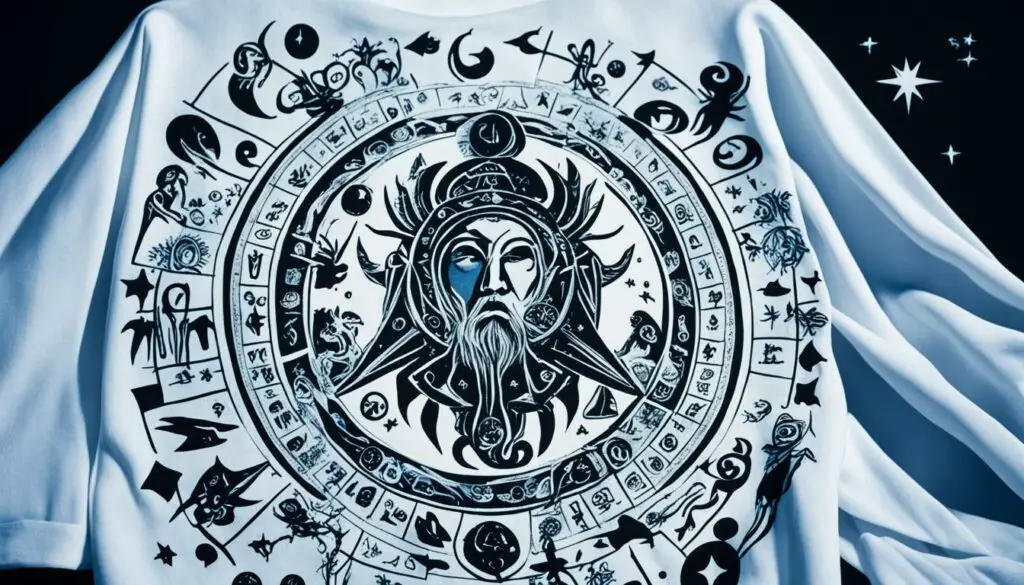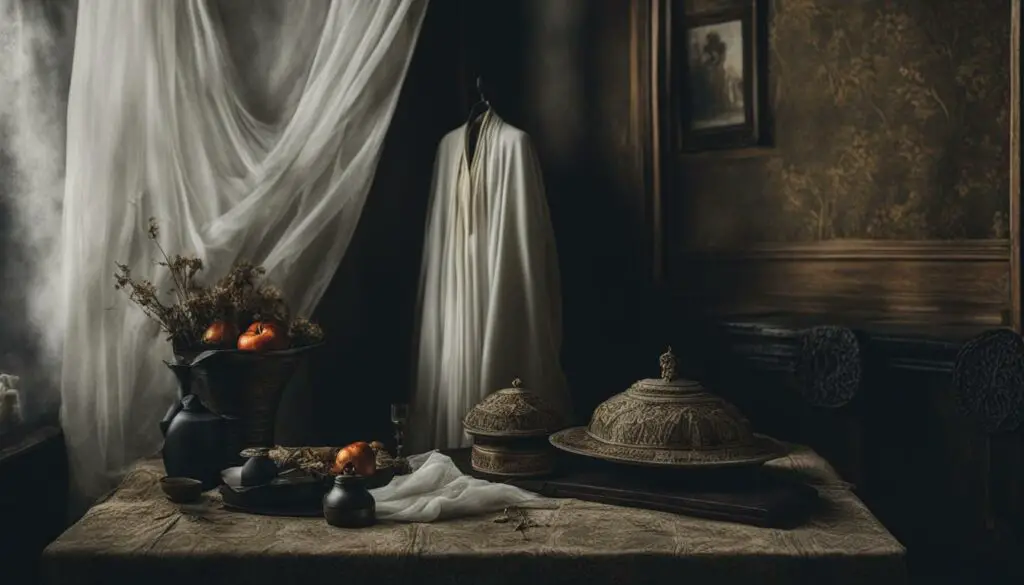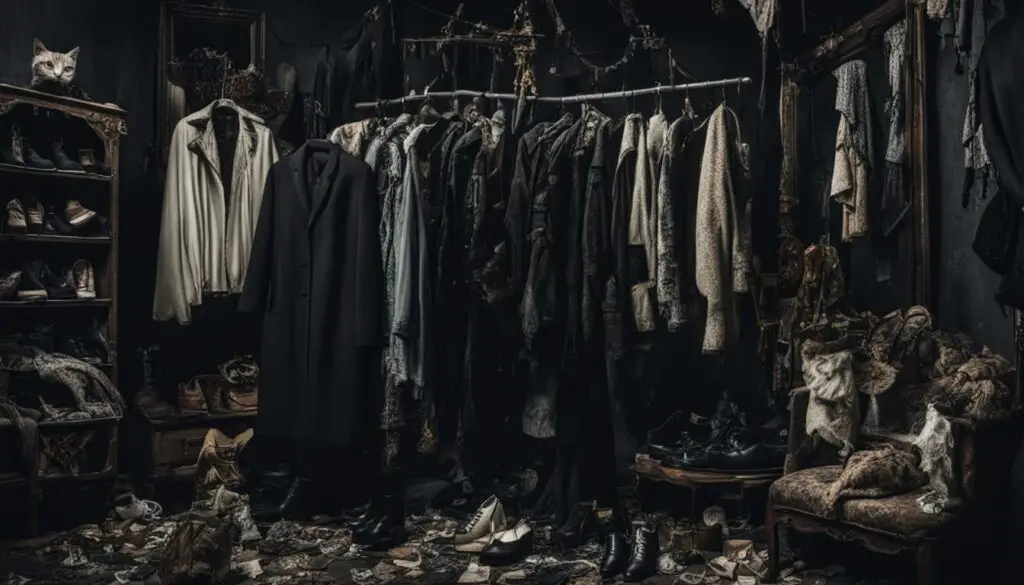Originally posted on January 24, 2024 @ 8:07 am
In various cultural and religious beliefs, the idea of wearing clothes belonging to a deceased person is accompanied by superstitions and beliefs. Many consider it bad luck or inauspicious to wear the garments of someone who has passed away. This belief has its roots in Hinduism and other cultures where reincarnation is a fundamental concept.
In Hinduism, wearing the clothes of the deceased is prohibited due to the belief in the soul’s journey and rebirth. It is believed that the departed soul is reincarnated into a new body, and wearing their clothes can evoke a sense of presence, memories, and emotions that may lead to depression or a feeling of loss. Astrology also emphasizes the donation of deceased individuals’ clothes as a means to help the departed soul find peace and bring blessings to the donor.
Key Takeaways:
- Wearing the clothes of a deceased person is considered bad luck or inauspicious in many cultures and religious beliefs.
- Beliefs stem from Hinduism and reincarnation, where the soul of the departed is believed to be reborn in another body.
- Wearing deceased persons’ clothes can evoke a sense of presence and memories, potentially leading to depression or a feeling of loss.
- Astrology encourages the donation of deceased individuals’ clothes, believed to help the departed soul find peace and bring blessings to the donor.
- The belief varies across cultures and personal experiences, with some individuals choosing to wear the clothing of the deceased as a way to honor their memory and feel close to them.
The Traumatic Experience of Wearing a Deceased Loved One’s Clothes

For many people, wearing the clothes of a deceased loved one can be an incredibly emotional and challenging experience. It can invoke a profound sense of their presence, evoking memories that may both comfort and distress. The act of wearing a deceased person’s clothing can dredge up intense emotions, leading to feelings of depression and a deep sense of loss.
When we wear the clothes of someone who has passed away, we become physically connected to them in a tangible way. The fabric holds their scent, their touch, and their essence, creating a powerful sensory experience. It’s not uncommon for individuals to feel as if the departed loved one is somehow still with them when they wear their clothing, offering a sense of solace and connection.
Memories tied to the deceased person often flood back when wearing their clothes. Each garment holds its own stories, reminding us of shared experiences, laughter, and tears. It can be a bittersweet experience, both comforting and heartbreaking at the same time.
“Wearing my mother’s dress felt like she was right there with me. I could almost hear her voice and feel her embrace. It brought back so many beautiful memories, but at the same time, it reminded me of the painful loss. It was a mix of emotions that I had to navigate.” – Emily, 35
This emotional impact is one of the primary reasons why wearing a deceased loved one’s clothes is often considered bad luck or inauspicious in certain beliefs. The intensity of the experience can be overwhelming for some individuals, leading to psychological distress and a sense of unease.
It’s important to recognize that the emotional significance attached to wearing deceased loved one’s clothes may vary from person to person. Some individuals find solace, comfort, and a sense of closeness by adorning these garments, while others may feel a deep sense of sorrow and choose to keep their distance. Personal beliefs, cultural perspectives, and individual experiences all play a role in shaping the perception and significance of this practice.
While it’s crucial to honor and respect cultural beliefs and traditions surrounding the deceased, it’s equally important to validate one’s own emotions and personal journey. Each individual will navigate the grieving process in their unique way, and their choices regarding the clothing of the deceased should be honored and understood.
Next, we will delve into the astrological beliefs surrounding deceased persons’ clothes. Stay tuned!
Astrological Beliefs Surrounding Deceased Persons’ Clothes

Astrology has a significant influence on the beliefs and traditions surrounding the handling of deceased persons’ clothes. According to astrological beliefs, the act of donating the clothes of the departed is considered a noble act that can bring peace to the departed soul and blessings to the donor or the deceased person’s family.
In astrology, it is believed that when a person passes away, their soul embarks on a journey to the afterlife. This journey involves detaching from their material possessions, including their clothing. By donating the clothes of the deceased, it is believed that we assist the departed soul in moving on and finding peace in their spiritual journey.
Donating clothes on behalf of the departed is seen as a gesture of compassion and respect. It symbolizes a recognition that the material belongings of a departed individual no longer hold the same significance and that it is important to let go and allow the soul to move forward. This act of donation is considered a noble act, not only because it helps the departed soul but also because it benefits others in need.
“Performing acts of charity and compassion is a noble way to honor the memory of the departed and bring blessings to oneself. When we donate the clothes of a deceased loved one, we contribute to the well-being of others and create positive karma.”
This belief in astrological significance explains why many individuals choose to donate the clothes of their departed loved ones. By participating in this noble act, they feel a sense of connection and goodwill, both towards the departed soul and towards those who will benefit from the donation.
Example:
Consider the following table that highlights the astrological beliefs surrounding the donation of deceased persons’ clothing and its associated blessings:
| Astrological Belief | Associated Blessing |
|---|---|
| Donating clothes helps the departed soul find peace | Peaceful transition and liberation for the departed soul |
| Performing a noble act brings blessings | Positive energy and good fortune for the donor and the deceased person’s family |
| Contributing to the well-being of others | Creating positive karma and fostering compassion |
Honoring the Deceased Through Donation

When a loved one passes away, one practical reason for donating their clothes is to help the poor. Many cultures place a high value on charity, and donating the clothing of a departed family member or friend is seen as a way to honor their memory while also doing a good deed. Not only does this act provide clothing to those in need, but it also carries the belief that such acts of charity can bring about good karma and positive energy for both the donor and the deceased person’s family.
By donating clothes to those less fortunate, you can make a meaningful impact on the lives of others while paying tribute to the memory of your loved one. It is a beautiful way to honor their spirit and continue their legacy of generosity and compassion. In some cases, individuals choose to organize clothing drives or donate to charitable organizations that specifically focus on helping the underprivileged.
Through these acts of charity, you can contribute to society and make a positive difference in the lives of those in need. The donation of clothes not only offers practical assistance but also serves as a lasting tribute to the values and character of the departed individual.
Quotes:
“Donating my mother’s clothes to a local charity was incredibly meaningful. It allowed me to help others and honor her memory at the same time. I truly believe that it brought us positive energy and a sense of peace.” – Jennifer Smith
Organizations Supporting Clothing Donations
| Organization | Description | Website |
|---|---|---|
| The Salvation Army | An international charitable organization that accepts clothing donations and supports various social programs. | www.salvationarmyusa.org |
| Goodwill | A nonprofit organization that operates thrift stores and uses the proceeds to fund job training programs. | www.goodwill.org |
| Dress for Success | An organization that provides professional attire to empower women to achieve economic independence. | www.dressforsuccess.org |
Donating clothes not only benefits those in need but also provides comfort and solace in knowing that your loved one’s belongings are being put to good use. It allows you to create a positive impact with lasting value. Remember, honoring the memory of the deceased through charity is a practical way to make the world a better place while keeping their spirit alive.
Cultural Perspectives on Wearing Dead People’s Clothes

Beyond Hinduism, various cultures and traditions hold distinct beliefs and superstitions regarding the clothing of the deceased. These cultural perspectives often stem from deeply ingrained traditional customs and long-standing notions surrounding death and the afterlife. In the context of these cultures, wearing the garments of the dead may be viewed as an omen or a means of inviting misfortune.
Traditional Beliefs and Customs
In many societies, specific traditional beliefs guide the handling of deceased individuals’ clothing. These beliefs are rooted in cultural practices and often associated with spiritual or superstitious notions. Depending on the culture, the act of wearing dead people’s clothes may be seen as disrespectful or inviting negative energy into one’s life.
For example, in certain African cultures, it is believed that wearing the clothes of the deceased can lead to evil spirits haunting the wearer. This belief reflects a deeply rooted sense of respect and fear surrounding the dead.
Omens and Superstitions
Wearing dead people’s clothes is often associated with various omens and superstitions across cultures. These beliefs stem from the notion that the clothing holds a connection to the deceased individual and can carry their spiritual energy or influence.
One prevalent superstition is that wearing the clothes of the dead brings bad luck. In some cultures, it is believed that the clothes retain the negative energy or spiritual essence of the deceased, which could transfer to the wearer, causing misfortune or even illness.
Examples of Cultural Perspectives
Here are a few examples of cultural perspectives and beliefs regarding wearing dead people’s clothes:
- In Irish folklore, it is believed that wearing the clothes of someone who has died can lead to encounters with spirits or ghostly apparitions.
- In parts of Southeast Asia, there is a belief that wearing the clothes of the deceased can attract wandering spirits and disrupt the harmony between the living and the dead.
- In some Native American cultures, wearing the clothes of the dead is viewed as disrespectful to the deceased and can bring about negative consequences or supernatural disturbances.
- Among certain European communities, it is believed that wearing the clothes of a deceased family member can result in eerie experiences or encounters with the spirits of the departed.
The Role of Cultural Perspectives
These cultural perspectives on wearing dead people’s clothes highlight the significance of traditional beliefs and the influence they continue to exert today. Understanding these perspectives can deepen our appreciation for the customs, superstitions, and spiritual beliefs associated with death and the afterlife in different cultures.
| Cultural Perspective | Beliefs/Customs |
|---|---|
| African Cultures | Wearing dead people’s clothes may invite evil spirits or negative energy. |
| Irish Folklore | Wearing the clothes of the deceased can lead to encounters with spirits. |
| Southeast Asian Cultures | Clothing of the dead can attract wandering spirits and disrupt spiritual harmony. |
| Native American Cultures | Wearing the clothes of the dead is seen as disrespectful and may bring negative consequences or supernatural disturbances. |
| European Communities | Clothing of deceased family members can result in eerie experiences or encounters with spirits. |
Consequences of Wearing Dead People’s Clothes

According to spiritual beliefs and cultural traditions, wearing the clothes of a deceased person can have significant consequences. Many cultures associate this practice with the potential invocation of negative energy or unwanted spiritual influences. It is believed that such consequences can manifest as bad luck, illness, or disturbances in one’s life.
These consequences vary depending on the cultural and spiritual beliefs associated with wearing deceased persons’ clothes. In some cultures, it is believed that the clothing retains the energy and essence of the departed soul, resulting in a transfer of negative energy to the wearer. This negative energy may disrupt the individual’s spiritual well-being and overall harmony.
Furthermore, some spiritual beliefs suggest that deceased persons’ clothes may carry the imprints of the person’s experiences or emotions, which can affect the wearer. These imprints can manifest as an overwhelming sense of sadness, grief, or even disturbances in daily life.
To illustrate the possible consequences, here is a quote from a spiritual practitioner:
“Wearing the clothes of a deceased person is like inviting their spirit into your life. This can disrupt your energy field and attract negative influences. It is important to respect the spiritual beliefs and practices surrounding death to maintain spiritual balance and well-being.”
It is important to note that these beliefs are deeply rooted in cultural and spiritual perspectives and may not hold true for everyone. The consequences associated with wearing deceased persons’ clothes should be considered within their respective cultural contexts and individual spiritual beliefs.
As with any aspect of spirituality, personal experiences and beliefs play a significant role. While some individuals may have experienced negative consequences, others may have different experiences or hold personal beliefs that overshadow potential consequences. It is essential to approach these beliefs and practices with an open mind and respect for diverse perspectives.
To visualize the consequences of wearing dead people’s clothes, here is a relevant image:
Myths and Misconceptions About Wearing Dead People’s Clothes

The belief that wearing dead people’s clothes brings bad luck or misfortune is often rooted in myths and misconceptions shaped by cultural beliefs and traditional customs. These misconceptions have led to a range of beliefs surrounding supernatural powers, curses, and negative energies associated with the clothing of the deceased. However, it is crucial to understand that these notions are subjective and should be interpreted within their cultural context.
“Wearing dead people’s clothes invites misfortune and supernatural powers.” – Misconception
There have been various cultural beliefs around the world surrounding the clothing of the dead. These beliefs stem from traditional customs, deep-rooted superstitions, and interpretations of misfortune or omens associated with death and the afterlife.
While myths and cultural beliefs can influence individual perceptions, it is essential to approach these ideas with an open mind and consider alternative viewpoints and personal experiences. What may be considered bad luck or misfortune in one context may not hold the same meaning or significance in another.
In reality, the act of wearing dead people’s clothes does not possess inherent misfortune or supernatural powers. The belief is often based on subjective interpretations and cultural customs that have been passed down through generations.
It is essential to respect the cultural diversity and traditions of different societies, while also acknowledging that personal beliefs and experiences may influence an individual’s perspective on this matter.
Debunking the Myths:
- Myth 1: Wearing dead people’s clothes brings misfortune and bad luck.
- Myth 2: The clothing of the deceased carries supernatural powers or curses.
- Myth 3: Wearing dead people’s clothes invites negative energies.
These myths and misconceptions should be understood within their cultural context and not generalized as universal truths. It is important to approach this topic with sensitivity and respect for different cultural beliefs and traditions.
Remember, personal experiences and individual beliefs may vary, and what may hold true for one person may not resonate with another. It is crucial to foster understanding, empathy, and open dialogue to challenge these misconceptions and broaden our understanding of cultural practices and customs.
Modern Perspectives on Wearing the Clothing of the Deceased
In modern times, individuals have developed a different outlook on the practice of wearing the clothing of the deceased. It is no longer solely associated with superstitions and taboos, but rather with emotional connections and honoring memories. For some, wearing the clothing of a loved one who has passed away provides a sense of closeness and comfort.
Many people find that wearing a deceased person’s clothing allows them to maintain a tangible connection to their loved one, evoking a strong sense of presence and sentimentality. It serves as a way to honor their memories and cherish the moments shared together. The clothing becomes a physical reminder of the person who has passed, offering solace and emotional support.
Personal beliefs also play a significant role in modern perspectives on this topic. Each individual may have their own reasons for choosing to wear the clothing of the deceased, which may deviate from traditional superstitions. Some may view it as a way to carry on the legacy of their loved one or to symbolize the continued bond they feel. Others may see it as a form of self-expression and a means of embracing their personal connection to the departed.
It is important to note that modern perspectives on wearing the clothing of the deceased are subjective and deeply personal. What may be meaningful and comforting for one person may not hold the same significance for another. This diversity of perspectives highlights the complex and multifaceted nature of human emotions and the individuality of grieving processes.
Ultimately, the choice to wear the clothing of the deceased is a personal one, guided by individual beliefs, emotions, and desires. It is a way for some individuals to navigate the grieving process and maintain a sense of closeness with their departed loved ones. As society evolves and cultural norms shift, it is essential to respect and appreciate the modern perspectives surrounding this practice.
Notable Quotes:
“Wearing the clothing of a deceased loved one allows me to feel their presence and keep their memory alive. It brings me solace and a sense of closeness that cannot be explained.” – Sarah Thompson
“For me, wearing my late grandmother’s dress is a way of honoring her and carrying on her legacy. It reminds me of the strong and resilient woman she was, and I feel a deep connection whenever I put it on.” – David Rodriguez
| Modern Perspectives on Wearing the Clothing of the Deceased | Key Points |
|---|---|
| Emotional Connections | Wearing the clothing can create a sense of closeness and emotional connection to the deceased individual. |
| Honoring Memories | Wearing the clothing is viewed as a way to honor and preserve the memories of the departed loved one. |
| Personal Beliefs | Individuals have their own unique beliefs and reasons for choosing to wear the clothing of the deceased. |
| Diverse Perspectives | Modern perspectives on wearing the clothing of the deceased vary and reflect the unique experiences and emotions of individuals. |
Examining the Belief in Light of Personal Experiences
Personal experiences and emotional significance hold great importance in understanding the belief surrounding wearing dead people’s clothes. For many individuals, adorning the garments of a deceased loved one offers more than a mere article of clothing; it provides a tangible connection to their departed loved one and a means of reminiscing about shared memories. This deeply personal choice allows them to feel close to the person who has passed away, evoking a sense of comfort and emotional significance.
Emotional Significance: A Window into the Past
Wearing the clothing of a deceased loved one can become a powerful experience, evoking a range of emotions and memories. Each item carries with it a unique sentimental value, reminding the wearer of moments spent together and the bond they shared. A shirt may conjure up memories of laughter shared during family gatherings, while a dress may evoke the image of a loved one’s elegance and grace. Such emotional significance brings forth a sense of comfort and a way to honor and preserve the memory of the departed individual.
A Tangible Connection to the Past
While photographs and other mementos can be precious reminders, the act of wearing the actual clothing of a departed loved one creates a tangible connection that extends beyond visual reminders. The touch of the fabric and the lingering scent can transport the wearer back in time, creating a physical link to moments cherished and shared. The sensation of wearing these clothes can provide a sense of closeness and offer comfort during moments of longing.
“When I wear my grandmother’s sweater, it’s as if she is enveloping me in a warm embrace once again. I can almost feel her presence and the love she showered upon me.” – Jane Doe
For individuals like Jane Doe, the act of wearing a deceased loved one’s clothing becomes a cherished ritual that allows them to maintain a tangible connection with the past and the person they dearly miss. The emotional significance attached to these garments becomes a source of solace amidst the pain of loss.
A Way to Reminisce and Preserve Memories
Wearing the clothing of a departed individual goes beyond the physical act; it becomes a vessel for reminiscing and preserving memories. Each item represents a chapter in their life story, a testament to their personality, and a cherished token of their existence. Donning these clothes allows individuals to feel immersed in their loved one’s presence, to remember, and to honor their legacy.
Whether it’s a cherished shirt worn during special occasions or a favorite pair of shoes that walked many miles, these garments carry with them stories that continue to resonate with those left behind.
| Personal Experiences | Emotional Significance | Reminiscing | Tangible Connection |
|---|---|---|---|
| Wearing the clothing of a deceased loved one | Elicits feelings of comfort and honor | Provides a way to reminisce about shared memories | Creates a tangible connection with the departed individual |
| Evokes a sense of presence and love | Preserves the memory of the departed individual | Immerses the wearer in their loved one’s presence | Allows for a physical link to moments cherished |
Conclusion
After examining the beliefs, myths, and cultural perspectives surrounding wearing dead people’s clothes, it is clear that this practice is rooted in personal beliefs and cultural traditions. While some cultures consider it bad luck or inauspicious, personal experiences and emotional connections may lead individuals to choose otherwise.
It is important to understand that these beliefs and myths have been debunked, and the choice to wear clothing that belonged to the deceased is ultimately a personal one. Modern perspectives highlight the emotional significance and sense of closeness that can be derived from honoring the memories of loved ones through their clothing.
As we navigate the cultural diversity in our society, it is essential to respect different beliefs and practices surrounding this topic. Each individual’s personal beliefs may deviate from traditional superstitions, and that is perfectly acceptable. By embracing cultural perspectives and acknowledging personal experiences, we can foster understanding and inclusivity.
FAQ
Is it bad luck to wear a dead person’s clothes?
Wearing the clothes of a deceased loved one can evoke a sense of their presence and memories, leading to feelings of depression or loss. In certain beliefs, it is considered bad luck or inauspicious.
What are the astrological beliefs surrounding deceased persons’ clothes?
Astrology encourages the donation of deceased individuals’ clothes as a way to help the departed soul find peace. It is believed that this act of donation can bring blessings to the donor and the family members of the deceased.
Why is donating the clothes of the deceased a practical reason?
Donating the clothes of a departed loved one is seen as a way to honor their memory and do a good deed. In many cultures, charity is highly valued, and this act of donation can bring good karma and positive energy to the donor and the deceased person’s family.
What are the cultural perspectives on wearing dead people’s clothes?
Various cultures and traditions hold beliefs and superstitions about wearing the garments of the deceased. These beliefs may stem from traditional customs or superstitions surrounding death and the afterlife.
What are the consequences of wearing dead people’s clothes?
Wearing the clothes of a dead person can be associated with negative energy or unwanted spiritual influences. Many cultures believe it can bring bad luck, illness, or disturbances in one’s life.
What are the myths and misconceptions about wearing dead people’s clothes?
Myths attribute supernatural powers or curses to the clothing of the deceased, leading to the belief that wearing them can cause harm or invite negative energies. These beliefs should be understood within their cultural context and may not hold true for everyone.
What are the modern perspectives on wearing the clothing of the deceased?
Some individuals may choose to wear the clothing of a deceased loved one to feel connected to their memory. It is a personal choice based on emotional attachments and a desire to honor their memories.
How does personal experience play a role in the belief surrounding wearing dead people’s clothes?
For some individuals, wearing the clothing of a deceased loved one provides a tangible connection and a way to reminisce about shared memories. It is a deeply personal choice that allows them to feel close to the person who has passed away.
What can we conclude about the belief in wearing dead people’s clothes?
The belief that wearing dead people’s clothes brings bad luck stems from cultural perspectives and personal beliefs. Each individual may have their own beliefs and reasons for wearing the clothing of the deceased, which may deviate from traditional superstitions.
Source Links
- https://www.ravishly.com/wearing-dead-people-s-clothing
- https://www.dnaindia.com/lifestyle/report-here-s-why-wearing-clothes-of-dead-people-is-banned-in-hinduism-astrology-reincarnation-karma-3040164
- https://www.timesnownews.com/spiritual/why-is-wearing-a-deceased-persons-clothes-is-considered-inauspicious-in-hinduism-article-100163019
